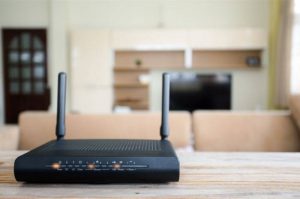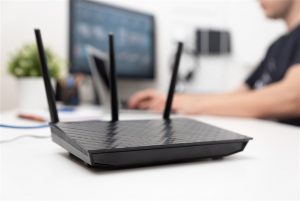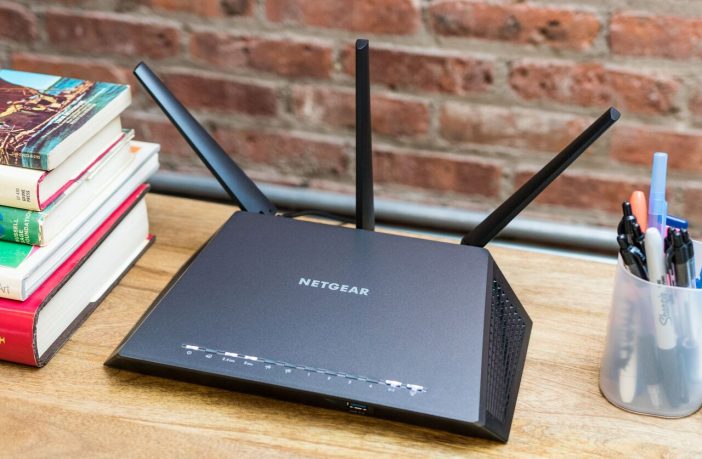While buying a wireless router might seem simple enough, there’s a lot to consider when picking the right router for your needs. With all the smart internet-connected devices ruling our lives these days, it’s more important than ever before to have a router that can handle the increased demand for WiFi connectivity. Before you whip out that credit card to invest in a new router for your home or office, here’s everything you need to know when buying a router.
Single or dual-band:
The first to consider when searching for a wireless router is figuring out whether you need a single or dual-band model.
Single-band routers operate on the 2.4 gigahertz frequency band are usually the least expensive router models you can buy. But, while you may save big on the price, a single-band model may offer reduced connectivity as it has to compete with other devices on the same frequency band, such as microwave ovens, Bluetooth devices, and wireless phones. If you’re hoping to use your router for simple tasks like connecting to social media or surfing the internet, then a single-band router is a good choice for your needs.
Dual-band routers have two radios, with one connecting to the 2.4 gigahertz frequency band and another connecting to the 5 gigahertz frequency band. The 5 gigahertz frequency band is usually less crowded, with minimal signal interference. If you’re hoping to do more complicated or higher-use tasks, like streaming video on more than one device at a time, or connecting to an online gaming platform, then you’re better off opting for a dual-band router. A dual-band router also allows you to assign a band to specific applications and clients, giving you the ability to ease the load on both bands and get better connectivity. Your neighbour’s wireless network may also interfere with your connectivity. If you live in a crowded neighbourhood or a densely populated area, then you’re better off with a dual-band router.

Do you need a modem?
Next, you’ll need to figure out if you need a router with a modem. If you’re starting from scratch, you’ll need to purchase both a modem and a router or a router with a built-in modem. While a modem connects to the internet, a router connects devices to WiFi. You can’t connect directly to the Internet with just a router, so if you don’t have a modem, it’s best to invest in a router with a built-in modem.
Consider new wireless technology:
The standards for wireless technology have changed quite a bit over the last decade. Newer laptops, smartphones and tablets utilise the newer standard, 802.11ac, which allow for faster speeds over WiFi. If you’re on an internet package with speeds of 100Mbps or more and you haven’t upgraded your router in a while, then it might be time for an upgrade. Using a router with outdated technology could result in limitations in the router’s wireless capabilities and slow connectivity. Keep in mind that a router’s performance can also degrade over time. If you’ve had the same router for a few years and can find no other explanation for a dip in the reliability of your network connection, then it may be time to consider replacing the router.

Take range into account:
You’ll also need to think about router range. Your router’s maximum range dictates how far devices can be from the router while still receiving a serviceable signal. For larger areas and big homes, you’ll need to pick up a router with a strong signal or use multiple routers spaced throughout the area with power-line adapters that use the existing electrical wiring in the walls to extend your network.
Look for extra features:
It’s also important to consider the features of the router you’ll need. If you’re looking to connect lots of wired devices like desktop PCs and home automation hubs to your router, then look for a router with at least 4 Ethernet ports. If your router will mostly be used to connect to wireless devices, then this will be less important.
More importantly, look for a router with at least one USB port. This will come in handy should you need to connect a printer to your router or want to create a shared wireless network using an external hard drive or a flash storage device. If you don’t need to network a printer that doesn’t have wireless capabilities or you don’t need networked storage, USB support on a router isn’t something you should be worried about.

Should you splash out on a smart router:
Not only are routers getting faster or more powerful, but they’re also getting smarter. Smart routers like the Linksys Smart WiFi routers make setting up and controlling your home network much easier. With a smart router you can easily prioritise bandwidth for things like streaming movies and video games using a connected smartphone app, and programme your router to automatically perform certain tasks at specific times. The possibilities are virtually endless.
Finding a router at the best price:
Whether you’re setting up a new home or office network or upgrading an existing one, the key component of the entire setup is the right wireless router. It can be the difference between a nearly flawless network and one that constantly gives you trouble.
Now that you know what to consider when buying a new wireless router PriceCheck can help you find the right router for you at the best price. Click below to browse a wide selection of wireless routers and find the best price on the router that suits your needs.





